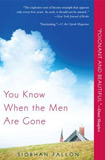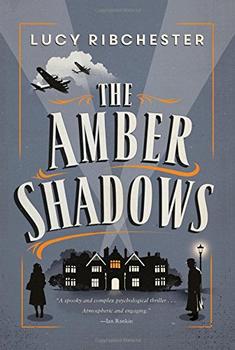Summary | Excerpt | Reading Guide | Reviews | Beyond the book | Read-Alikes | Genres & Themes | Author Bio

In You Know When the Men Are Gone, debut author Siobhan Fallon vividly shows readers the human cost of the current conflict in Iraq, both on the front lines and, just as poignantly, on the home front. Fallon, who lived at Fort Hood while her husband completed two tours of duty, writes with authority and authentic emotion about the challenges and conflicts facing soldiers and the families they leave behind.
In the title story, Meg, a soldier's wife who has resisted pressure to have children because she dreads the thought of raising babies alone while her husband is deployed, becomes fixated on her new next-door neighbor, a beautiful Serbian immigrant whose troubling personal history and cavalier attitude toward parenting both frighten and fascinate Meg.
In "Camp Liberty," Sergeant David Mogeson, a former investment banker who joined up after 9/11, finds himself torn between the easy luxury and leisure he left behind and the more intense life he's found in Iraq. Both offer their own temptations, and their own threats. In "The Last Stand," soldier Kit Murphy returns home injured but hopeful—until his young wife delivers an unpleasant surprise.
Throughout this collection of loosely interwoven stories, the name of one officer—Sergeant Schaeffer—arises repeatedly. Readers know little about this man or his family, other than that he died in an IED explosion and, intentionally or accidentally, saved the life of one of his men, Kit Murphy. The repeated invocation of Sergeant Schaeffer's name becomes incredibly powerful when, in the collection's final story, we finally meet the man's widow, Josie. Josie is coming to terms with being the widow of a fallen hero, with the appreciative hugs and pitying glances of strangers, with her own ambivalence about army life. When Kit Murphy pays her a visit, Josie— in a simple but palpably desperate gesture— reaches out to him for one more glimpse of her husband as she remembers him best, before all her memories of him become abstractions.
Given the subject matter and the currency of Siobhan Fallon's debut story collection, it would have been easy for her stories to lapse into melodrama or sentimentality. Instead, Fallon's writing displays masterful restraint, trusting her characters' all-too-believable stories of infidelity and temptation, of mistrust and hope to speak for themselves. And speak they do, in a way most civilians will find shocking and moving simultaneously. For many years, Tim O'Brien's collection of short stories, The Things They Carried, has been required reading for those who want to really understand the human cost of the Vietnam War. In You Know When the Men Are Gone, Siobhan Fallon has done the same thing for our current conflict, showing readers the human faces and hidden dramas of war.
Useful to note: Siobhan is an Irish form of Joan, and is pronounced Sh-vawn
![]() This review was originally published in The BookBrowse Review in February 2011, and has been updated for the
January 2012 edition.
Click here to go to this issue.
This review was originally published in The BookBrowse Review in February 2011, and has been updated for the
January 2012 edition.
Click here to go to this issue.

If you liked You Know When the Men Are Gone, try these:

by Lucy Ribchester
Published 2017
During the dangerous days of World War II, Honey Deschamps is spending her days transcribing decrypted messages at Bletchley Park, when she starts to receive bizarrely coded packages. When everyone is keeping secrets, who can you trust?

by Robert Oldshue
Published 2016
In upstate New York, a November storm is one that comes early in the season. If it catches people off-guard, it can change them in the ways Oldshue's characters are changed by different but equally surprising storms.
Your guide toexceptional books
BookBrowse seeks out and recommends the best in contemporary fiction and nonfiction—books that not only engage and entertain but also deepen our understanding of ourselves and the world around us.